

Gender biased family services: killing children in the UK. The reports of Filicide, the murder by a mother of her child, are all over the news this week.

Baby P, Daniel Pelka, Hamzah Khan, Keanu Williams being just four names that are engraved upon our consciousness, not just because of their untimely deaths, but because of the nature of the suffering inflicted upon them before they died. Collective handwringing is in evidence up and down the land and who is to blame is being widely discussed. The sight of the Head of Birmingham Children’s Safeguarding Board attempting to squirm out of the reality of her responsibility for allowing yet another death of a child to happen on her watch, was excrutiating on the BBC news last night. Her words, in a statement released this week scream out the reality of why children are dying.
‘I wish, on behalf of all the statutory agencies who sit on the Board to express very deep regret and distress about Keanu’s death. Www.insead.edu/facultyresearch/research/doc.cfm?did=50114. Totalitarianism. A Point of View: Is democracy overrated? 9 August 2013Last updated at 12:59 ET Democracy is championed as a universal good by the West, but we over-estimate its power to guarantee personal and political freedom, argues Roger Scruton.
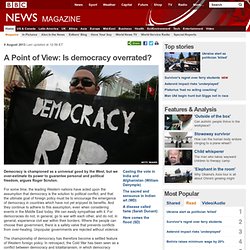
For some time, the leading Western nations have acted upon the assumption that democracy is the solution to political conflict, and that the ultimate goal of foreign policy must be to encourage the emergence of democracy in countries which have not yet enjoyed its benefits. And they continue to adhere to this assumption, even when considering events in the Middle East today. We can easily sympathise with it. For democracies do not, in general, go to war with each other, and do not, in general, experience civil war within their borders.
The championship of democracy has therefore become a settled feature of Western foreign policy. Democracy was introduced into Russia without any adequate protection for human rights. So what are these institutions? Communism. Communism is represented by a variety of schools of thought, which broadly include Marxism, anarchism and the political ideologies grouped around both.
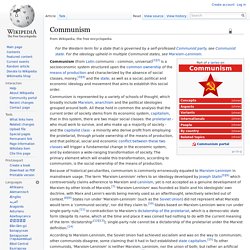
All these hold in common the analysis that the current order of society stems from its economic system, capitalism, that in this system, there are two major social classes: the proletariat - who must work to survive, and who make up a majority of society - and the capitalist class - a minority who derive profit from employing the proletariat, through private ownership of the means of production, and that political, social and economic conflict between these two classes will trigger a fundamental change in the economic system, and by extension a wide-ranging transformation of society. The primary element which will enable this transformation, according to communism, is the social ownership of the means of production.
Because of historical peculiarities, communism is commonly erroneously equated to Marxism-Leninism in mainstream usage. Socialism. Socialism is a range of economic and social systems characterised by social ownership and democratic control of the means of production,[10] as well as the political theories and movements associated with them.[11] Social ownership may refer to forms of public, collective or cooperative ownership, or to citizen ownership of equity.[12] There are many varieties of socialism and there is no single definition encapsulating all of them,[13] though social ownership is the common element shared by its various forms.[5][14][15] Etymology The origin of the term "socialism" may be traced back and attributed to a number of originators, in addition to significant historical shifts in the usage and scope of the word.
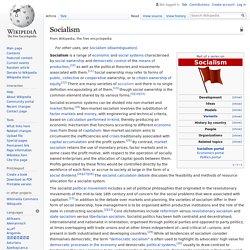
For Andrew Vincent, "[t]he word ‘socialism’ finds its root in the Latin sociare, which means to combine or to share. The related, more technical term in Roman and then medieval law was societas. History Early socialism Paris Commune First International Second International Early 20th century. Agrarianism. Agrarianism has two common meanings.
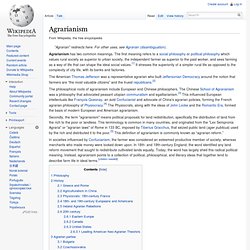
Capitalism. Bolshevik. The Bolsheviks were the majority faction in a crucial vote, hence their name.

They ultimately became the Communist Party of the Soviet Union.[6] The Bolsheviks came to power in Russia during the October Revolution phase of the Russian Revolution of 1917, and founded the Russian Soviet Federative Socialist Republic which would later become the chief constituent of the Soviet Union in 1922. The Bolsheviks, founded by Vladimir Lenin and Alexander Bogdanov, were by 1905 a major organization consisting primarily of workers under a democratic internal hierarchy governed by the principle of democratic centralism, who considered themselves the leaders of the revolutionary working class of Russia.
Their beliefs and practices were often referred to as Bolshevism. Nationalism. Nationalism is a belief, creed or political ideology that involves an individual identifying with, or becoming attached to, one's nation.

Libertarian socialism. Overview[edit] Libertarian socialism is a Western philosophy with diverse interpretations, though some general commonalities can be found in its many incarnations.
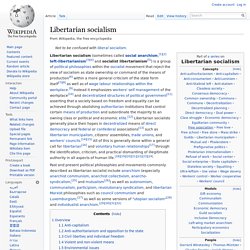
10 Reasons to Listen to Both Sides of Any Story. There’s no such thing as a plain-vanilla story.

It wouldn’t be a story, just some boring facts. Storytellers have to tug at the heartstrings of their audience. They have to beef up the details. And paint the picture — happy or sad, dreadful or triumphant, hopeless or inspiring, good or bad. Whenever someone tells you a story, there’s something in it for them. And this doesn’t just go for fantasy stories, but also:
Marxism. Marxism is a worldview and a method of societal analysis that focuses on class relations and societal conflict, that uses a materialist interpretation of historical development, and a dialectical view of social transformation.
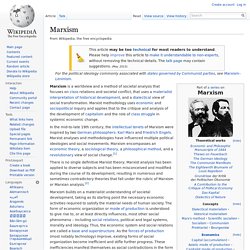
Marxist methodology uses economic and sociopolitical inquiry and applies that to the critique and analysis of the development of capitalism and the role of class struggle in systemic economic change. In the mid-to-late 19th century, the intellectual tenets of Marxism were inspired by two German philosophers: Karl Marx and Friedrich Engels. Marxist analyses and methodologies have influenced multiple political ideologies and social movements. Rhythmix. We all know someone who could work but doesn't - Don't we? Well, there's that Jim at number 27. Have you seen his garden?? Out there all weathers he is. It's like the bleedin Chelsea Flower Show. Now you can't tell me he couldn't work? Jim is 62. He still never leaves his home. It's just got ridiculous! She never made any friends and ran away from home when she was 15. At 18, she managed to get a place in a hospice and with the amazing help of mental health workers, counsellors and a safe environment, she got clean.
She has managed to start volunteering in a local centre working with other young people who've been through what she went through and hopes that one day, she might be able to make a career of it. She has never spoken to any of her neighbours, she's still too damaged, and she certainly wouldn't tell them about her childhood.
Do you remember Doreen? Since then, he's suffered from Post Traumatic Stress Disorder. He makes Doreen promise she won't ever tell anyone what he goes through. The BBC seems to be running a "Scrounger" season. A Point of View: Just figures of fear or fun? 4 November 2011Last updated at 16:40 From Roman emperors to Colonel Gaddafi, it's easy to turn tyrants from figures of fear into figures of fun. But while their behaviour was often brutal and bloody, that's not all they were, writes Mary Beard. On 11 March, 222 AD, a posse of rebel soldiers tracked down the Roman Emperor Elagabalus to his hiding place - he had come to power in a coup just four years earlier, supposedly dividing his time between fundamentalist religious reforms, corruption and self-indulgence - but not before they had sodomised and skewered some of his few remaining loyal troops.
Now the tyrant was holed up in a latrine, desperately hoping to keep clear of the liberators, out for his blood. No such luck.